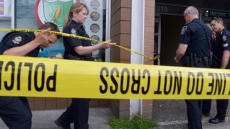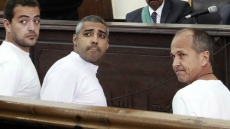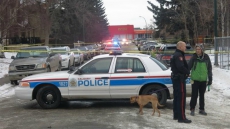TORONTO — It's been nearly 40 years since Ebola first appeared on our radar, and in those years nearly two dozen outbreaks have occurred.
That's plenty of time to learn lots about a virus and the disease it causes, wouldn't you think?
If you answer yes, you'd be mistaken. There still remain more questions than answers about Ebola. Still, the catastrophic and ongoing West African outbreak has taught the world a number of things about this deadly disease.
Here are some:
Lesson: Ebola's geographic range is greater than we knew.
Prior to 2014, Ebola outbreaks had always clustered around two distinct parts of the globe.
Ebola Reston, a type that doesn't appear to sicken people, has been found in the Philippines — or in monkeys purchased from there by laboratories elsewhere.
The three Ebola species that cause most human disease — Zaire, Sudan and Bundibugyo — seemed to hid in the forests of a clutch of countries in equatorial Africa, just below the broad shelf of the continent's northern portion. All known outbreaks have occurred in the Democratic Republic of Congo (formerly Zaire), the Republic of Congo, Uganda, South Sudan and Gabon.
There has never before been an outbreak in West Africa. Back in 1994, though, there was a hint that Ebola might be lurking in this part of the world.
A scientist working in Tai Forest in the Ivory Coast became ill after doing an autopsy on a dead chimpanzee. The strain that infected him — now known as Tai Forest — has only ever been seen that once.
The West African outbreak is caused by Ebola Zaire. It had never been seen west of Gabon, which is more than 2,000 kilometres from the eastern edge of Liberia, the eastern most of the three main countries in this outbreak.
Lesson: Ebola outbreaks can be really, really large.
With the official case count cracking the 20,000 mark this week — and it is considered to be a significant underestimate — it's a bit self-evident to say that Ebola outbreaks can become huge.
But this time last year, when the first cases in this outbreak were falling sick and dying in eastern Guinea, if you had asked most public health experts how big an Ebola outbreak could be, you'd have been hard pressed to come up with a number remotely close to this one.
"Nobody ever anticipated the size of this epidemic," says Christopher Dye, a World Health Organization epidemiologist who is director of strategy for Ebola in Director-General Margaret Chan's office.
The largest previous outbreak involved 425 cases. This one is 47 times bigger than that. And it is nowhere near over.
Lesson: Urban Ebola is a nasty beast to wrangle.
Ebola outbreaks typically occur in remote settings, places where villages encroach on the forests that are home to bats thought to be Ebola's natural hosts.
That often makes getting to the outbreaks challenging, involving hours or days of spine-crushing drives on rudimentary roads. But it also served to contain spread of the virus. In these settings, there are finite numbers of people to infect.
But this outbreak got into cities — Conakry, in Guinea, Sierra Leone's Freetown and Monrovia, in Liberia. These are cities with crowded slums and populations that regularly travel back and forth between villages in other parts of each country — or even across borders into one of the other two.
Ebola suddenly had so many more people within reach.
"So what we now know is that if you have probably a large, rapidly moving, well mixed population crossing national borders and so on, that the outcome of an Ebola outbreak can be quite different from what we've seen typically in equatorial Africa," says Dye.
Ebola expert Dr. Heinz Feldmann puts it more bluntly.
"We learned that if this outbreak hits a highly mobile population and gets into urban centres, that our response was inadequate," says Feldmann, head of virology at the U.S. National Institute of Allergy and Infectious Diseases's Rocky Mountain Laboratories in Hamilton, Mont.
Lesson: Ebola cases can travel from Africa to Europe or North America. And that can lead to some spread in the new locale.
It's been assumed that someone infected with Ebola might travel out of Africa. There have actually been a couple of recorded cases of tourists getting infected with Marburg, a viral cousin, then travelling home to the United States and the Netherlands.
Still, health authorities in developed countries have confidently predicted that if one of these diseases arrived in one of their hospitals, sophisticated health-care systems with well-developed infection control programs would ensure the infected person would not transmit the virus to anyone else.
But then three nurses — one in Spain, two in Dallas, Tex. — became ill treating Ebola patients. There was no additional spread beyond the nurses, but their infections were a harsh wake-up call.
Lesson: The tried-and-true response techniques work. But they can be hell to scale up.
The mantra of Ebola control has long been that a three-pronged approach would break the back of any outbreak.
Find and isolate people infected with the virus. Identify and monitor their contacts, quickly whisking any who become sick into isolation. Ensure those who die are buried safely because contact with corpses — part of many funeral rituals in parts of Africa — spreads the virus.
All along in this outbreak, even when numbers were soaring at unthinkable rates, old Ebola hands insisted that if those three conditions were met, the West African epidemic could be stopped.
And while the end of this outbreak isn't in sight, the slowing of its growth suggests the measures are having an effect.
"There's nothing particularly different, qualitatively, about this Ebola epidemic. Quantitatively ... it's different. Because it's big. And there are lots of chains of transmission going on across three countries," Dye says.
"But when you do the things that we expected to work, we know now that they work. There's enough empirical evidence from all three of the countries that are infected."
Still, knowing how to stop spread and actually doing it remains an elusive goal in some places, because of the sheer scale of the epidemic.
"If you have 10 cases and there were 100 contacts, you can trace them. If you have 100 cases and there's a thousand contacts, maybe you can trace them too. But if you have 10,000 cases, you can't trace them," says Dr. Daniel Bausch, who teaches tropical medicine at Tulane School of Public Health and Tropical Medicine in New Orleans.
Bausch, who has worked on a number of Ebola outbreaks over the years, says it has also become clear the tried-and-true methods must be brought into the technological age. Trying to track cases and contacts from lists on paper doesn't cut it.
"We outstripped the capacity of the relatively antiquated old school ways that we were doing things and we need to get many, many aspects of this into a much more modern age."
Lesson: Global health governance systems aren't well adapted to problems this large.
The World Health Organization has been hammered for being slow to respond to the crisis, declaring it an international public health emergency in August, two months after the group Doctors Without Borders warned the outbreak was out of control.
In September the United Nations set up its first ever emergency health mission which goes by the acronym UNMEER — the UN Mission for Ebola Emergency Response. It, with help from the World Bank and other agencies, have been co-ordinating efforts since.
There are lots more Ebola treatment centres operating now than there were in the bleak days of late August and early September. But those on the ground still see co-ordination problems. And plans are slow to adapt when the needs change — such as a sharp drop in cases in former hotspots, but flare ups elsewhere.
Dr. Joanne Liu, a Canadian who is the international president of MSF, says the outbreak has shown that international governance structures need to be revised.
"So either WHO is going to step up to the plate and we're going to give them the means to be able to respond, or we're going to create something else," she says.
Lesson: The social mobilization part of the response needs more work.
One of the challenges of this outbreak stemmed from the fact that West Africans didn't know Ebola.
That lack of knowledge made them distrust messages about the need to eschew traditional funeral rites or to bring sick loved ones to treatment facilities. Rumour spread that the outsiders warning of Ebola were actually bringing the virus to communities.
Getting people to understand what Ebola is and how it spreads has been a slow and painful process. And it is ongoing. Liu notes MSF recently tried to open a temporary holding centre in a part of Guinea still experiencing cases.
The community made it clear they wanted the MSF staff to leave.
"They've been dealing with Ebola since March. So we have to admit that if we still are welcomed like this, it means that the community mobilization and education is obviously not working. We don't have the right strategy," Liu says.
Lesson: Despite a decade of outbreaks by novel diseases, we still haven't got systems in place to rapidly develop and test drugs and vaccines.
After the 2004 SARS outbreak, there was lots of talk about the need to develop ways to do crucial research during a crisis. During SARS, by the time the people trying to contain the spread of the disease had time to craft plans for clinical trials to test drugs, the outbreak was over.
Scientists have been working for years on experimental vaccines and drugs for Ebola. But these are things that can only be tested during an outbreak. And most outbreaks are too small and too short to do that work.
This epidemic would seem to be the perfect chance to see if these experimental products work. But planning and getting approvals for clinical trials — and making enough of the vaccines and drugs to conduct the studies — has taken months.
The most advanced trial for an-Ebola specific product is slated to start this month in Liberia. But the decline in cases there is raising questions about whether the study — to test two Ebola vaccines — will be able to enrol enough volunteers to show whether the vaccines work.
Dr. Jeremy Farrar, director of Britain's Wellcome Trust medical charity, says public health's global capacity to detect emerging threats like Ebola or the H1N1 pandemic flu virus has improved since SARS. But the ability to incorporate research studies into the response has not.
"I've been through many of these epidemics myself. It's a chaotic crisis and you're wanting to fight the fires and respond to the crisis," says Farrar, whose organization is funding a number of the planned trials.
"But I think we've all got an obligation to the patients that are in front of us today but also to make sure that hopefully the patients who are coming in tomorrow have a better deal. And ... I'm sorry to say I just don't think we've learned a sufficient number of lessons."
Feldmann says one of those lessons should be that science needs to have the funding to pursue therapeutics for diseases like Ebola, because they could become global threats.
"I think this is a good lesson: If we don't want to scream for vaccines and therapies we just have to work on these rare diseases. And we have to find the money to do this. Or we have to shut up and when they become a problem not start pointing fingers at each other."





